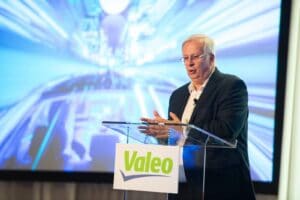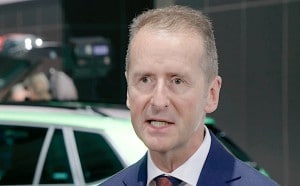
Pledges by a number of automakers to become carbon neutral are now being mirrored by at least one of the auto industry’s top suppliers, which is promising to become carbon neutral by the middle of the century.
Valeo, a large French supplier with operations in Europe, North America and Asia, said it plans to achieve carbon neutrality across its global business operations by 2050. By 2030, Valeo’s emissions will have decreased by 45% across its entire value chain – including emissions from its suppliers, its own operating activities and the end use of its products – compared with 2019, the company noted.
The company also signed the “Business Ambition for 1.5C campaign that brings together companies committed to achieving carbon neutrality by 2050 using the framework of the Science Based Targets initiatives.
The move follows similar commitments made by its customers. General Motors said it is committed to carbon neutrality by 2040 and Ford Motor Co. also has committed to carbon neutrality by 2050. Several European brands have made similar proclamations in recent weeks.
Chairman says carbon neutrality necessary

“The entire automotive industry is investing heavily to combat global warming,” said Valeo’s Chairman and Chief Executive Officer Jacques Aschenbroich.
“At Valeo, the reduction of carbon dioxide emissions has been central to our strategy since 2010, and sales generated from technologies that help to reduce carbon dioxide emissions have grown 20-fold to around 10 billion euros in 2021. We intend to continue our efforts, with the aim of achieving carbon neutrality by 2050 and reaching nearly half of this objective by 2030.”
Valeo intends to spend $480 million to fulfill 45% of this commitment across its entire value chain – including suppliers – by 2030.
In addition, starting this year, the company’s success at reducing carbon dioxide emissions and sustainable development criteria will be taken into account when determining the compensation of more than 1,500 senior executives.
Valeo lays out plans
A number of Valeo plants are already piloting renewable energy alternatives, including three locations in Chennai, India, where 90% of consumption is wind powered. Plants in Sanand, India and Bad Rodach, Germany are now using their own solar energy facilities to produce 30% and 20% of the energy they consume, respectively.

By 2030, Valeo expects to invest more than 400 million euros in reducing emissions related to its operating activities. These investments will be used to upgrade the group’s sites to enable the current 100 most carbon-intensive facilities to become high-energy efficiency sites by 2030. Upgrades will include the development of eco-friendly buildings, the widespread use of LED lighting and the integration of heat recovery systems.
The proportion of low-carbon energy in the Group’s energy consumption will increase from 5.5% in 2019 to 80% by 2030, having already risen to 50% by 2025. The company has also set the same emissions reduction objectives for its suppliers, and the use of low-emission materials will be increased.
Much of this effort is driven by mandates by the European Union, which wants carbon neutrality achieved by 2050. European automakers have been working to implement changes to meet the deadline. Volkswagen and Daimler both announced plans to hit the target by 2050. More recently, other auto companies, recently Bentley Motors revealed as part of its Beyond100 plan it plans to be carbon negative by the end of this decade.







